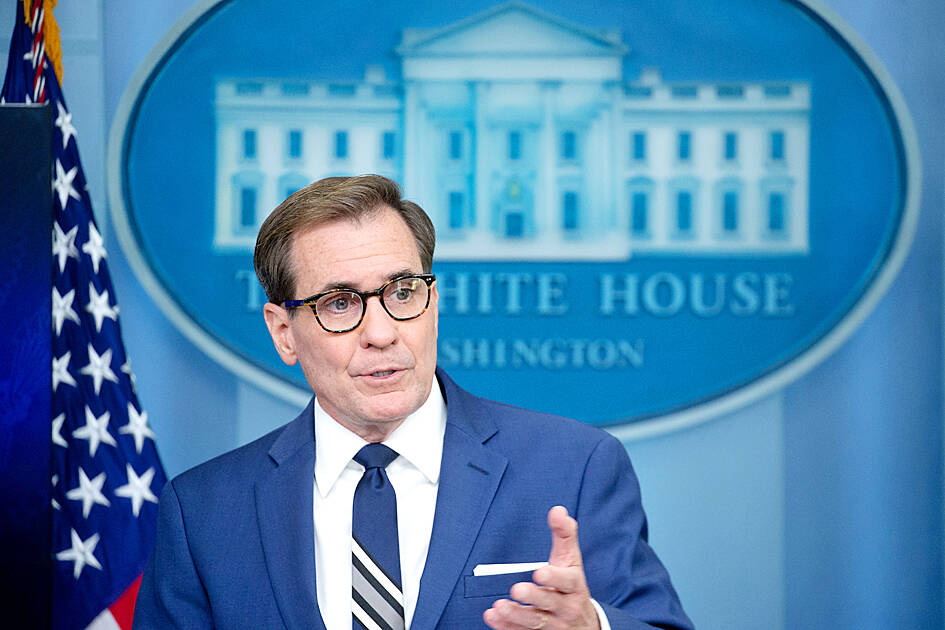The White House on Thursday denied a report that China is planning to set up a surveillance base in Cuba.
The Wall Street Journal reported that Beijing and Havana have entered into a secret agreement for a Chinese electronic eavesdropping facility on the Caribbean island that could monitor communications across the southeastern US.
The region includes the US southern and central command headquarters, both in Florida.

Photo: EPA
China would pay Cuba “several billion dollars” to construct the facility, the Journal said, citing unnamed US officials.
US National Security Adviser for Strategic Communications John Kirby denied the story.
“I’ve seen that press report. It’s not accurate,” Kirby told MSNBC.
“What I can tell you is that we have been concerned since day one of this administration about China’s influence activities around the world, certainly in this hemisphere and in this region,” he said.
“We are watching this very closely,” he added.
Pentagon spokesman Brigadier General Pat Ryder also called the Journal report inaccurate.
“We are not aware of China and Cuba developing any type of spy station,” Ryder said, adding that “the relationship that those two countries share is something that we continuously monitor.”
However, US senators Mark Warner and Marco Rubio, who head the US Senate Intelligence Committee and are usually briefed on important security matters, said in a statement that they were “deeply disturbed” by the Journal report.
“The United States must respond to China’s ongoing and brazen attacks on our nation’s security,” they said.
“We must be clear that it would be unacceptable for China to establish an intelligence facility within 100 miles [161km] of Florida and the United States,” they said.
The Journal report comes amid strained relations between Washington and Beijing over a range of issues that include US support for Taiwan.
Chinese President Xi Jinping (習近平) has pushed a rapid expansion of the country’s security presence around the world, aiming to match the broad presence of the US military on all the continents.
A base in Cuba, which lies 150km off the southern tip of Florida, would present the most direct challenge yet to the continental US.
The Soviet Union had electronic spying facilities in communist Cuba to monitor the US.
However, in 1962 when Moscow moved to base nuclear missiles on Cuba, the US declared a “quarantine” of the nation in a crisis that threatened to bring the two superpowers to war, until Moscow backed down.

‘TAIWAN-FRIENDLY’: The last time the Web site fact sheet removed the lines on the US not supporting Taiwanese independence was during the Biden administration in 2022 The US Department of State has removed a statement on its Web site that it does not support Taiwanese independence, among changes that the Taiwanese government praised yesterday as supporting Taiwan. The Taiwan-US relations fact sheet, produced by the department’s Bureau of East Asian and Pacific Affairs, previously stated that the US opposes “any unilateral changes to the status quo from either side; we do not support Taiwan independence; and we expect cross-strait differences to be resolved by peaceful means.” In the updated version published on Thursday, the line stating that the US does not support Taiwanese independence had been removed. The updated

‘CORRECT IDENTIFICATION’: Beginning in May, Taiwanese married to Japanese can register their home country as Taiwan in their spouse’s family record, ‘Nikkei Asia’ said The government yesterday thanked Japan for revising rules that would allow Taiwanese nationals married to Japanese citizens to list their home country as “Taiwan” in the official family record database. At present, Taiwanese have to select “China.” Minister of Foreign Affairs Lin Chia-lung (林佳龍) said the new rule, set to be implemented in May, would now “correctly” identify Taiwanese in Japan and help protect their rights, the Ministry of Foreign Affairs said in a statement. The statement was released after Nikkei Asia reported the new policy earlier yesterday. The name and nationality of a non-Japanese person marrying a Japanese national is added to the

AT RISK: The council reiterated that people should seriously consider the necessity of visiting China, after Beijing passed 22 guidelines to punish ‘die-hard’ separatists The Mainland Affairs Council (MAC) has since Jan. 1 last year received 65 petitions regarding Taiwanese who were interrogated or detained in China, MAC Minister Chiu Chui-cheng (邱垂正) said yesterday. Fifty-two either went missing or had their personal freedoms restricted, with some put in criminal detention, while 13 were interrogated and temporarily detained, he said in a radio interview. On June 21 last year, China announced 22 guidelines to punish “die-hard Taiwanese independence separatists,” allowing Chinese courts to try people in absentia. The guidelines are uncivilized and inhumane, allowing Beijing to seize assets and issue the death penalty, with no regard for potential

‘UNITED FRONT’ FRONTS: Barring contact with Huaqiao and Jinan universities is needed to stop China targeting Taiwanese students, the education minister said Taiwan has blacklisted two Chinese universities from conducting academic exchange programs in the nation after reports that the institutes are arms of Beijing’s United Front Work Department, Minister of Education Cheng Ying-yao (鄭英耀) said in an exclusive interview with the Chinese-language Liberty Times (the Taipei Times’ sister paper) published yesterday. China’s Huaqiao University in Xiamen and Quanzhou, as well as Jinan University in Guangzhou, which have 600 and 1,500 Taiwanese on their rolls respectively, are under direct control of the Chinese government’s political warfare branch, Cheng said, citing reports by national security officials. A comprehensive ban on Taiwanese institutions collaborating or